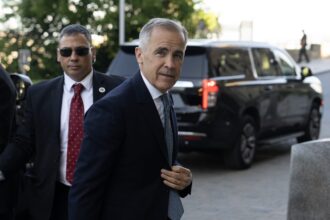In a striking revelation that underscores shifting continental dynamics, a growing number of Canadians now perceive the United States as a potential threat to their national security and economic stability. Recent polling data reveals this sentiment has reached unprecedented levels, reflecting a profound transformation in the traditionally close relationship between the two North American neighbors.
The comprehensive survey, conducted by the Angus Reid Institute last month, indicates that 38% of Canadians now view the United States as a “somewhat serious” or “very serious” threat—a figure that has surged significantly since similar assessments conducted prior to 2020. This perception crosses demographic boundaries, though it appears particularly pronounced among younger Canadians and those residing in border communities.
“What we’re witnessing is not merely a reaction to specific policies, but rather a fundamental reassessment of Canada’s position in relation to its dominant neighbor,” explains Dr. Eleanor Hastings, Professor of International Relations at the University of Toronto. “The perceived vulnerability stems from economic dependency, potential political instability in the U.S., and diverging values on key issues.”
The data reveals a complex picture of Canadian concerns. Economic factors rank prominently, with 64% of respondents expressing worry about potential trade disruptions and tariffs that could severely impact Canadian industries. This economic anxiety appears well-founded, considering that approximately 75% of Canadian exports are destined for American markets, creating an inherent vulnerability to U.S. policy shifts.
Political concerns have emerged as equally significant. The prospect of democratic backsliding or institutional deterioration in the United States has 57% of Canadians worried about spillover effects on Canadian governance and sovereignty. Climate policy divergence and border security considerations also feature prominently in the findings.
“The relationship has always contained asymmetries, but what’s different now is the explicit acknowledgment of these power imbalances by ordinary Canadians,” notes Dr. Hastings. “Previously, cultural similarities and shared values masked these structural inequalities in public perception.”
The federal government has responded to these shifting attitudes with measured diplomatic approaches. Prime Minister Justin Trudeau has emphasized continued cooperation while simultaneously pursuing economic diversification strategies and strengthening ties with other global partners. This balancing act reflects the delicate position Canadian leadership finds itself in—acknowledging public concerns while maintaining essential political relations with Canada’s largest trading partner.
Foreign policy experts caution against overreaction, noting that despite increased tensions, the Canada-U.S. relationship remains fundamentally strong, built on centuries of cooperation, shared values, and deeply integrated economic systems. Yet the psychological shift revealed by the polling data cannot be dismissed as temporary or insignificant.
“What we’re seeing may represent a permanent recalibration of Canadian national identity—one that acknowledges the necessity of the relationship with the United States while also recognizing the importance of maintaining meaningful independence,” explains Dr. Michael Chen, a global affairs analyst at the Canadian Institute of International Relations.
The polling data also reveals regional variations in sentiment. Atlantic Canadians express the highest levels of concern at 44%, while Albertans report the lowest at 29%—differences that reflect varying degrees of economic integration and political alignment across provinces.
As both nations approach potential political transitions in the coming years, a critical question emerges: Will this growing wariness fundamentally reshape the North American partnership, or will the deep structural connections between these neighbors ultimately ensure continuity despite fluctuating public sentiment?

























